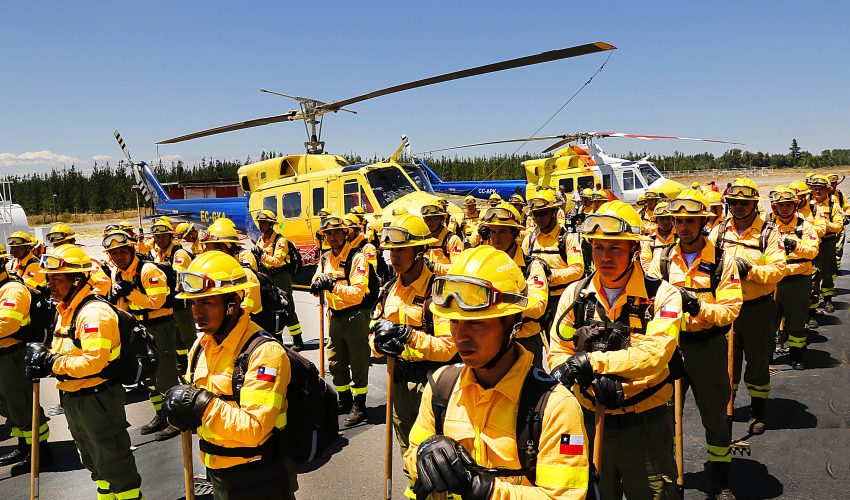Ahead of the wildfire season in the Biobío Region, the private sector has established preventive and combat plans for potential fire incidents.
With an investment exceeding US$100 million, forestry companies, in collaboration with the National Forestry Corporation (Conaf) and Firefighters, are preparing their brigades, equipment, and aircraft.
Before over 400 representatives from the community, emergency services, and authorities, Cmpc presented its established resources to tackle forest fires in the area, along with details of the technical and human support to be deployed. Additionally, brigades from the company Arauco, Conaf, and Chile’s Firefighters also participated in the event.
"The figure we have available, which is public, is around US$40 million. Conaf’s figures are also public (...) I understand that over US$100 million is available between public and private organizations for firefighting," emphasized Luis Felipe Gazitúa, Chairman of Cmpc’s Board.
The Chairman of Cmpc’s Board also referred to the previous wildfire season in February 2023 and the resource investment for this year. "What we did was look at other global experiences because, even though we have cutting-edge technology here, it’s always good to learn from others. We received advice from North American companies and, based on that, defined a plan and developed a strategy for this year’s firefighting efforts. It includes, marginally, some additional resources but also a different way of deploying them," added Gazitúa.
Resources
In detail, the company has 9 tanker planes for initial firefighting, 2 coordination planes, 12 helicopters, and 179 brigades, divided into ground brigades, tanker brigades, mechanized brigades, female interface brigades, multipurpose brigades, and forestry brigades, totaling 1,326 equipped and trained firefighters.
The Regional Ministerial Secretary (Seremi) of Government for Biobío, Jacqueline Cárdenas, also participated in the event, held at Cmpc’s Trilahue Air Base in Cabrero, and commented, "The lesson starts with prevention. Today, we’ve seen that the private sector has also allocated significant resources not only to combat but also to prevent fires, as people’s lives and safety are the top priority."
In addition to fire prevention and combat plans, the Seremi added, "We highlight the night patrol initiative, which wasn’t in place last year but is now available. This allows us to ensure preventive safety across the three provinces with these four patrols and the 42 brigades—around 500 firefighters—deployed to be present throughout the Biobío Region."
Another aspect emphasized by the Government Seremi was the preventive work for this season, detailing that "in 2022-2023, around this same time, we had 600 or more fires. Today, we know of 230 fires in the region, which shows that preventive efforts and the responsibility of both private and public sectors, especially when linked to the territory and civil society, have been effective."
Representing the forestry sector as a whole, Margarita Celis, Regional Manager of the Chilean Wood Corporation Biobío – Ñuble (Corma), stated, "After last season ended, we began working closely with various stakeholders—the Government, Regional Government, Firefighters, the Presidential Delegation, and the National Disaster Prevention and Response Service (Senapred)—to develop alert protocols and preventive climate deployment strategies."
One of the areas hardest hit by wildfires in the Biobío Region was the commune of Cabrero. Its mayor, Mario Gierke, addressed the needs identified in firefighting, saying, "We must know the territories to quickly locate water sources, whether through private or neighbor-owned pools, artificial ponds, wetlands, natural lagoons, or streams in the area. What’s needed is a registry of all water points to supply those fighting the fires."
Eliana Calpan, leader of Cmpc’s Interface Brigade 811, a team responsible for protecting homes and infrastructure near forested areas, made an appeal during the event, stressing, "We must prevent fires from spreading, avoid starting them, and be very careful. Also, be aware of the damage being caused—it’s immense harm to the environment and the affected neighbors."
Source:www.diarioconcepcion.cl







Comentarios (0)
No hay comentarios aún. ¡Sé el primero en comentar!
Deja un comentario